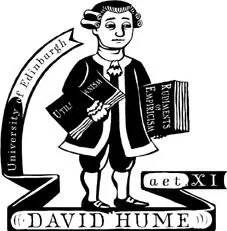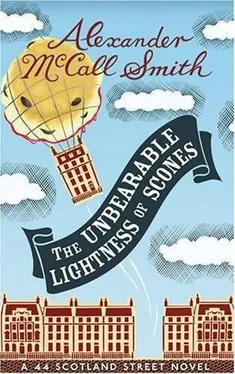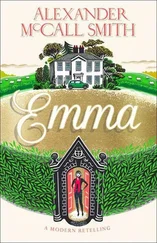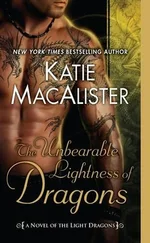“Quiche? Ach well, make it a double for me. Double quiche. And lots of tomato sauce.”
Angus rose to his feet and passed the order to one of the young men behind the counter, who glanced at Lard and raised an eyebrow.
“I came over frae Glasgow,” said Lard, when Angus returned to the table. “I wanted to see my wee pal Matthew at his picture shop. But there’s a closed sign and it says he’s away for another week. All the way frae Glasgow fur nuthin. Jings. What a waste of time.”
Angus glanced at the parcel – it was painting-size. So Lard had acquired a painting, and how would he have done that? Fallen off something, no doubt.
“You have a painting to show him?”
“Aye. It’s a picture of a man. A bonny picture. Old. Fifty years at least.”
Angus glanced at the parcel again. “Perhaps you’d like to leave it with me,” he said. “Matthew is on his honeymoon – in Australia. I can keep it for him until he comes back.”
Lard seemed to weigh this proposal for a while before he nodded his assent. “It would be easier, right enough. I dinnae fancy carting that back tae Glasgow.”
“May I ask what the painting is?” asked Angus.
“Take a look if you like,” said Lard. “Up at the top there. Take the paper aff.”
Angus reached over and peeled the paper away at the top of the parcel. The frame, he noted immediately, was of good quality, gilt, with a patina of age. He looked up at Lard. “Nice,” he said. “Very nice.”
He pushed the paper further down, and as he did so he caught his breath, loudly, so loudly that Cyril looked up. Raeburn. It was unmistakeable. Sir Henry Raeburn, the greatest of the Scottish portrait painters of the late eighteenth and early nineteenth centuries, heir to the genius of Allan Ramsay, the man who captured the spirit of Edinburgh in subtle reds and blacks, in shadows and folds of cloth, and in cautious, astute eyes.
But when he looked further down, and saw the face, he could hardly contain himself. It was believed that Raeburn had painted Robert Burns, but the portrait had been lost. This was it. This was the Bard, caught on a visit to the capital; the comet of his genius passing quickly over the Edinburgh firmament, but slowly enough for Raeburn to preserve for posterity. And here was the result, in the parcel of a Glasgow heavy, in every sense of the word.
Lard studied Angus’s expression. “Will you look after it, then? Just for a week?”
Angus looked up from the painting. “I’d look after it till all the seas gang dry,” he said. “And the rocks melt wi’ the sun.”
“Does that mean yes?” asked Lard.
Angus nodded. “Yes, it does.”
“You’ve got an awfie odd way of expressing yoursels here in Edinburgh,” said Lard. “You sez wan thing and mean anither.”
The day on which Bertie was due to go to his first meeting of the First Morningside Cub Scout Pack was, for him, a day of extraordinary excitement. He knew that the issue of his membership had divided his parents; he had heard the arguments between them – often intense – and he had picked up from his mother’s manner that she had, on this question at least, been defeated. It was unlike his father to stand up to his mother – he knew that from long experience – but on this point at least he had done so. This new determination, however, had not carried through on the question of the Swiss Army knife, which had somehow been shelved. But Bertie had decided that one victory was enough, especially in a campaign in which one side had, until now, been consistently defeated. So nothing more was said of the knife lest it disturb the apparently settled matter of cub scout membership.
Of course there was another respect in which the membership of the cub scouts seemed an uncertain matter, and not one to be counted upon. This was the issue of age. In the literature on the matter that Bertie had perused, it stated quite clearly that the age at which one might join the cub scout movement was eight. Before that, it appeared that there was another organisation, the Beavers, which one might join at the age of six before progressing, in the fullness of time, to the dizzy heights of the cub scout section itself. Bertie was six, and had been six for some time, and although there were occasions on which he had used the fact of being six as a defence, this was not one. When Irene had insisted, for instance, that he join the Edinburgh Teenage Orchestra, Bertie had pleaded that he was seven years too young for that; to no avail. Chronological age had never put Irene off – she had once talked about the possibility of Bertie’s being admitted to university on the grounds that he was sufficiently advanced intellectually to hold his own there, and this had led to an acrimonious exchange with an admissions tutor at the University of Edinburgh who had, for some strange reason, taken a contrary view.
“And at what age did David Hume start at the University of Edinburgh?” Irene had shouted down the telephone. “Would you care to inform me of that?”
“I have no idea,” said the tutor. “But that is not the point, I’m afraid. There are now rules…”
“Eleven,” interjected Irene. “Hume was eleven when he enrolled at your university.”
The tutor sighed. “Things were very different in the eighteenth century. One can hardly…”

“And Mozart?” interrupted Irene again. “Perhaps you could refresh my memory as to Mozart’s age when he composed his first symphony?”
“Mozart was a prodigy. Yes. But these days… Health and Safety…”
“Mozart was eight,” said Irene. “Eight.”
“And what age is your son, again?”
“He’s six, in strict chronological terms. But the whole point that I’m making is that what counts is intellectual maturity. But let us not prolong this argument. I can see that you’re unwilling to budge. There are other universities, you know. There’s St. Andrews.”
“You’re welcome to phone them. Please don’t let me inhibit you,” said the tutor. “But if he went off to St. Andrews, who would supervise bedtime? And make sure he brushed his teeth?”
That had been the last that had been said of university – to Bertie’s relief – but the experience had taught Bertie that chronological age counted for his mother only if it would prevent his doing something that she was unwilling for him to do, whereas it did not count if it prevented his doing something that she wanted him to do. It was simple really. As far as the cub issue was concerned, he thought that she was probably unaware of the potential age bar, and so he decided to say nothing about it.
He had discussed it, though, with Tofu.
“Don’t you have to be at least eight?” Bertie asked. “Look. It says so here in this leaflet I found. It says that if you’re under eight you have to join the Beavers. Then you can go to cub scouts when you’re eight.”
Tofu had grabbed Bertie’s leaflet. “Give it here,” he snapped. “Where does it say that?”
Bertie had shown him, and Tofu had frowned. “So what?” he said. “We just tell them that we’re eight. I look big enough to be eight, and if you stand behind me they won’t even see you when we join up.”
Bertie was shocked. “But that’s fibbing,” he said. “And you mustn’t tell fibs. It says that here too. Look, it says that cub scouts must be truthful. That means no fibs.”
Tofu laughed. “They always say that,” he said. “They say that you shouldn’t tell fibs, but they don’t really mean it.”
“Then why do they say it?” asked Bertie.
Читать дальше













